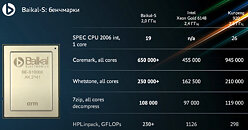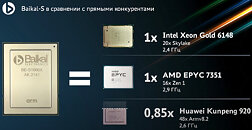- Joined
- Aug 19, 2017
- Messages
- 2,841 (1.03/day)
In recent years, government institutions have been funding the development of home-grown hardware that will power the government infrastructure. This trend was born out of a desire to design chips with no back doors implemented so that no foreign body could monitor the government's processes. Today, Russian company Baikal Electronics managed to boot up the Baikal-S processor with 48 cores based on Arm Instruction Set Architecture (ISA). The processor codenamed BE-S1000 manages to operate 48 cores at a 2.0 GHz base frequency, with a maximum boost of 2.5 GHz clock speed. All of that is achieved at the TDP of 120 Watts, making this design very efficient.
When it comes to some server configurations, the Baikal-S processor run in up to four sockets in a server board. It offers a home-grown RISC-V processor for safe boot and management, so the entire SoC is controlled by a custom design. Baikal Electronics provided some benchmark numbers, which you can see in the slides below. They cover SPEC2006 CPU Integer, Coremark, Whetstone, 7Zip, and HPLinkpack performance. Additionally, the company claims that Baikal-S is in line with Intel Xeon Gold 6148 Skylake design and AMD EPYC 7351 CPU based on Zen1 core. Compared to Huawei's Kunpeng 920, the Baikal-S design provides 0.86x performance.



In 2022, the company plans to produce 10,000 BE-S1000 SoCs and 30,000 of them in 2023. While this may not seem like a lot, we don't know what capacity is Baikal Electronics working with. So for more details, we have to wait.

View at TechPowerUp Main Site
When it comes to some server configurations, the Baikal-S processor run in up to four sockets in a server board. It offers a home-grown RISC-V processor for safe boot and management, so the entire SoC is controlled by a custom design. Baikal Electronics provided some benchmark numbers, which you can see in the slides below. They cover SPEC2006 CPU Integer, Coremark, Whetstone, 7Zip, and HPLinkpack performance. Additionally, the company claims that Baikal-S is in line with Intel Xeon Gold 6148 Skylake design and AMD EPYC 7351 CPU based on Zen1 core. Compared to Huawei's Kunpeng 920, the Baikal-S design provides 0.86x performance.



In 2022, the company plans to produce 10,000 BE-S1000 SoCs and 30,000 of them in 2023. While this may not seem like a lot, we don't know what capacity is Baikal Electronics working with. So for more details, we have to wait.

View at TechPowerUp Main Site







 I was not aware of that.
I was not aware of that.
